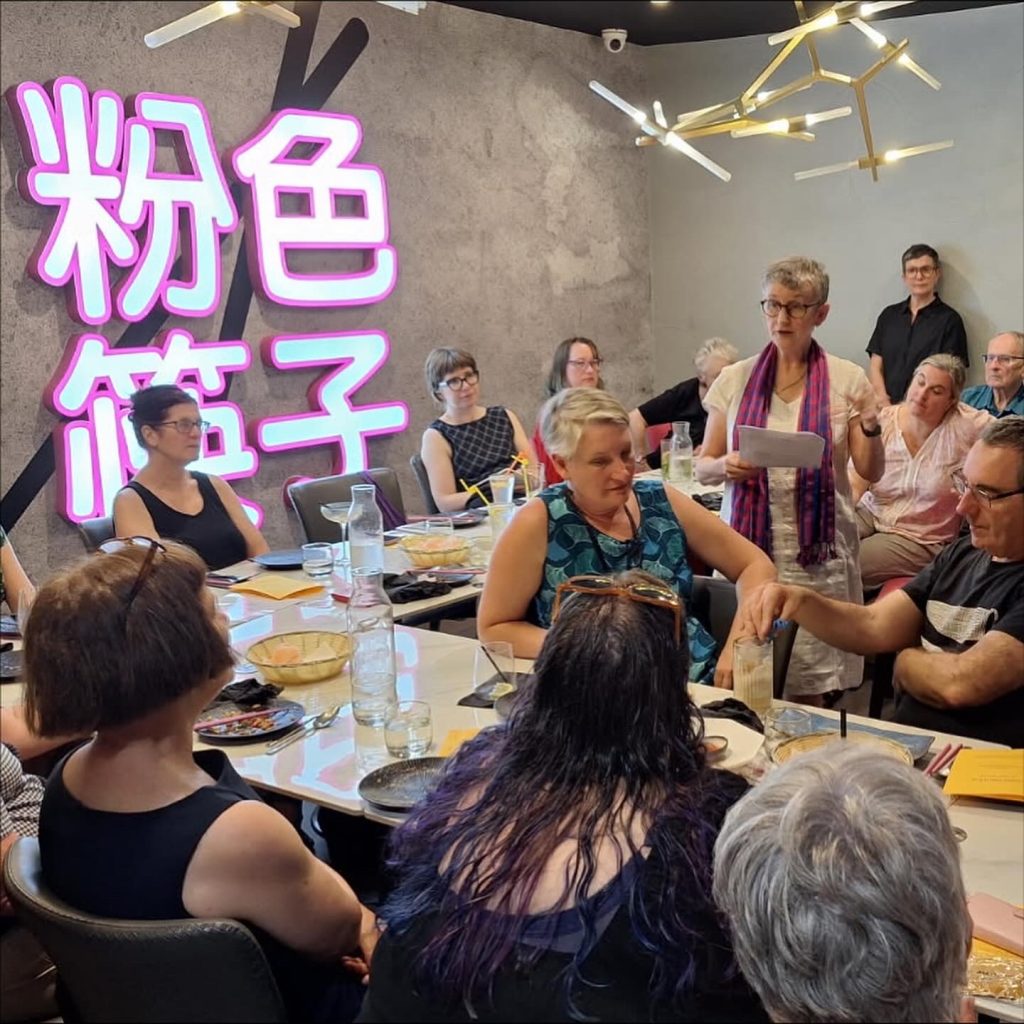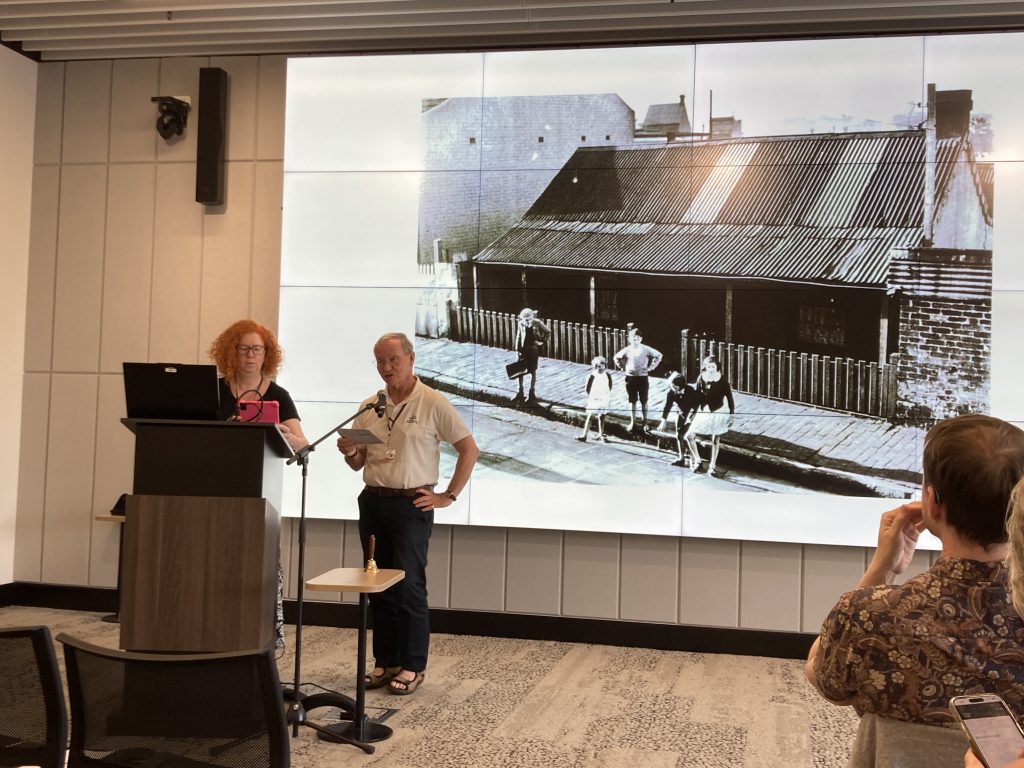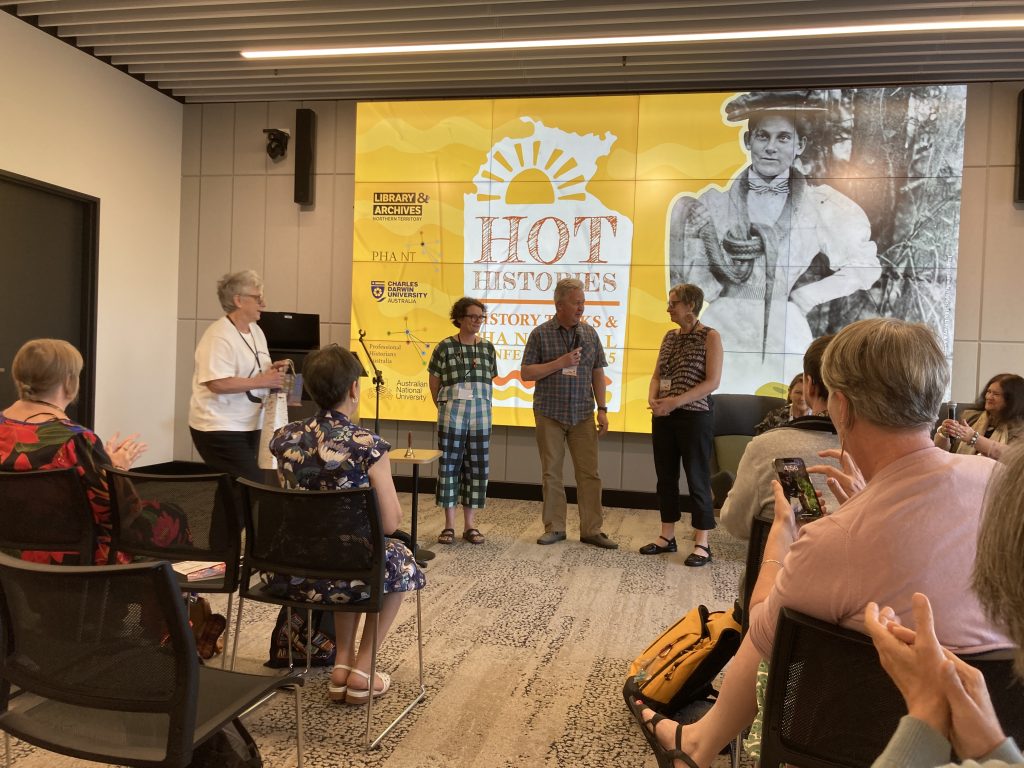We hope you all enjoyed the PHA National Conference that was held in Darwin between 25–26 October. If you were not able to make it, don’t worry, the two recipients of the travel bursary have provided two comprehensive reports. Thank you to Jacqui Newling and Allison O’Sullivan for taking the time to prepare these reports.
Lauren Samuelsson, the PHA (NSW & ACT) Events Coordinator, is currently planning an event that brings together a selection of papers from the conference, so look out for for more information in a future edition of the PHA eNewsletter.

Dr Jacqui Newling
Thanks to a bursary from PHA NSW/ACT, I was able to attend the 2025 PHA National Conference, held on Larrakia Country in Darwin. The conference was a roaring success, attracting over 70 people for a two-day program inspired by the theme Hot Histories. An added bonus for out-of-towners was the pre-conference program of tours, museum visits and social events.
There were too many personal standouts to detail here, but papers will be published in the next edition of Circa, which I encourage members to feast upon to find their own favourites.
A hot ticket
The Hot Histories conference was ably led by PHA NT president Samantha Wells and national president Lucy Bracey (PHA Vic/Tas), and a cohort of helpers. It was held in the recently opened Library and Archives NT (LANT) in the new Charles Darwin University (CDU) Danala campus in Darwin’s CBD. The LANT team were very welcoming and generously supported the event, opening the library out-of-hours and providing full tech support. Remarkably, the organising committee managed to ensure the conference was free of charge and open to all. They created a genuine sense of welcome and inclusivity.
Proceedings began with a heartfelt Welcome to Country from Larrakia and Warramungu Elder Dr Richard Fejo. Rather than a respectful formality, the Welcome foregrounded a more indepth conversation-style presentation with Samantha Wells about the historical and contemporary significance of ceremonial welcome practices in light of ongoing campaigns that threaten to – in the current vernacular – ‘cancel’ them.
Day 1 continued with twelve presentations from PHA NT, WA and SA members, and local researchers from Charles Sturt University, LANT, and Museum and Art Gallery NT (MAGNT), with localised emphases on Darwin, the tropical north and central Australia. The conference dinner at Pink Chopstix that evening was a lively affair, punctuated with my conference paper, ‘Some like it hot’. Day 2 offered fourteen presentations, all from PHA members mostly from the eastern states, including six from the NSW/ACT branch. PHA NSW/ACT member Stephen Gapps kicked the day off with a ‘hot off the press’ pre-release copy of the new book that he co-edited with three other authors, The Australian Wars. He also floated his idea for his next book (embargoed for now, so delegates’ privilege!).
Rather than being grouped into themed sessions, presentations were a broad-ranging mix of people-centred, place-based, or practice focused, with the quest for truth and ethics principles at their core. The diversity of, and approaches to, subjects was stimulating; speakers were very respectful of keeping to time; and at no point did either day feel slow or draining.
The conference closed with the formal announcement of changes in the national committee, which were voted on at the well-attended AGM which took place in the grounds of the Darwin Ski Club on Friday, 24 October. Lucy Bracey was congratulated for her excellent contributions as president and Jeff Hopkins-Weise was warmly welcomed into the role.
Reflection and takeaways
Overall, the Hot Histories conference has left me thinking about vulnerability and resilience – partly due to the power of place; the city of Darwin is so significantly shaped by destructive environmental and wartime events, but also, as the conference demonstrated, legacies of colonialism. Several conference papers highlighted how vulnerable we are in broader terms: to the effects of climate, global conflicts, political ambitions, social ideologies, gendered power relations, cultural prejudices, and fear of the truth. Some presenters expressed vulnerabilities that professional historians face. Many practitioners are at the mercy of funding and operating costs, time constraints, employers’ or clients’ priorities and agendas, access to archives and knowledge holders, the unknown impacts of AI, and so on. Historians also contend with other people’s fears of vulnerability, which can occur when the histories we produce conflict with their understanding of the subject, and our research threatens to destabilise their ideas and truths. Yet the conference also delivered positive stories, showcasing examples that acknowledge and respond to past crises in constructive ways, such as the Cowra Peace Garden as a place of reflection and healing (Francesca Beddie) and the rebuilding of Darwin using cyclone-resistant engineering (Richard Gillespie) and many other histories of resilience. Coming together to share our research and methodologies, exchange and debate ideas, and support each other with current challenges, offers reassurance and inspires confidence in the quest for and promotion of truth in meaningful ways.
Attending the conference reinforced, for me, the role PHA plays as a service to its members, and the importance of historians’ service to society more broadly. It also galvanised my commitment to being an active member of the NSW/ACT branch committee, which has given a much greater sense of purpose and belonging in my role as a public historian. It also proved what a generative, connective and worthwhile endeavour public history work can be. I’m very grateful to PHA NSW/ACT for the bursary as I would not have been able to attend without this assistance. I encourage members to participate in future conferences, with or without funding – if they meet the Hot Histories standard, they’ll be worth every penny.

Dr Allison O’Sullivan
The PHA conference saw me visit Darwin and the Northern Territory for the first time, and I was immediately impressed with the sense of history there. It was such a good setting for the conference! Although I was unable to attend any of the pre-conference events due to other commitments, I was lucky to meet many of the attendees at an evening gathering on Friday and enjoy an incredible sunset while discussions of history and heritage unfolded over dinner, which really set the mood for the weekend ahead.
The first morning opened with a heartfelt Welcome to Country by Elder Dr Richard Fejo which evolved into a wonderfully in-depth discussion about the importance of Welcomes and Acknowledgements within contemporary Australian culture.
The conference papers presented over the two days were all excellent: incredibly varied in their content but united by the importance of their subject matter and the passion of the presenters. Standouts included Stephen Gapps’ discussion of the Australian War Memorial and his book The Australian Wars, co-edited with Rachel Perkins, Mina Murray and Henry Reynolds; Maisie Austin’s history of the Parap Camp and the Australian Half-caste People Association (AHPA); Malcolm Traill’s examination of the upcoming bicentenary of Albany and the evolving discussion about the ways in which these landmark events should be celebrated/commemorated to include everyone; and Francesca Beddie’s discussion of The Cowra Memorial Gardens anniversary as an example of ‘getting it right’, and in exploring the ethics of interpreting previous conflict and uncomfortable subject matter.
Further themes included: the tyranny of distance in Australia when attempting to access records, particularly with regards to Aboriginal history and colonial recordkeeping (Matthew Stephens); Colonial exploration and collection practices, and the necessity of repatriation for cultural healing (Martin Thomas); re-inserting women into colonial histories which emphasise the contributions and achievements of men (Paige Taylor); re-evaluating historical examples of culturally biassed writing to rehabilitate information (Eleanor Hogan); colonial outposts in the Far North which failed, such as Somerset on Cape York (Jeff Hopkins-Wise); the parallel evolution of Barbie, commercialisation and consumption culture (Pauline Hastings); the professional ethics of revealing scandals in the family (Hannah Viney, Jane Mills-Harding); and of course the current and future problems of AI and misinformation in the social media age (Roland Leikauf, Deb Lee-Talbot, Sarah Craze).
The lightning talks provided a real challenge to all participants including myself: how to condense our areas of interest into only five minutes? We managed to cover subjects as disparate as rediscovering an invaluable archive of rock art photography; the importance of local history collections and the volunteers who run them; family and local histories that can turn into research gold; the history of larrikinism and the social and economic conditions under which it developed and thrived; revisiting the history of a natural disaster to tell the story of a community which felt that its original trauma had never been properly recognised; and the ways in which an object, be it a photograph or a chair, can open the doors to wider historical narratives.
Jacqui Newling’s special presentation at dinner on the history of spice in European cuisine was fascinating, although a little hard to hear at times due to the vibrant restaurant setting. The chilli vinegar is developing as per instructions in our kitchen as we speak, and we are waiting to use the curry powder to cook up the chicken recipe provided by Jacqui!
Aboriginal history and cultural practice were at the forefront of the conference. Matthew Stephens made the point in his presentation, “History is not in the past when working with Aboriginal communities.” Karen George’s presentation on the difficulty of accessing government, religious and private archives for Aboriginal people stressed that “our stories are our own.” There are certainly challenges ahead for Aboriginal historians, and any historians working in or adjacent to Aboriginal stories (as we often are.) The papers presented provided many opportunities to discuss the ways in which we can help to centre Aboriginal voices, both historical and current, in the interpretation of Australian history.
More generally, the conference reminded me (in the best possible way) of how little I know, how much I have to learn, and how important conferences are for the exchange of knowledge and ideas. I left with a very full reading list, a better understanding of many different places and people, and inspired to continue researching and writing history! It was an excellent opportunity to meet with an amazing group of professionals from all over the country, many of whom I would not have had the opportunity to speak with otherwise.
